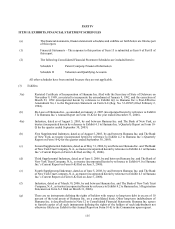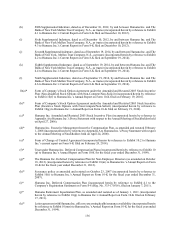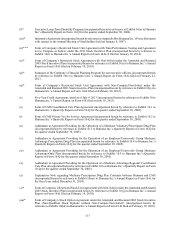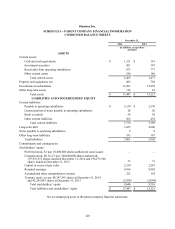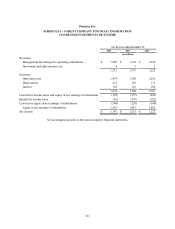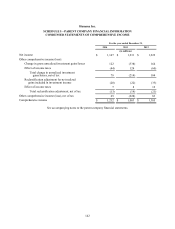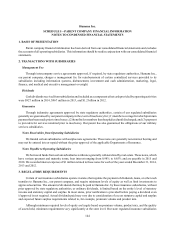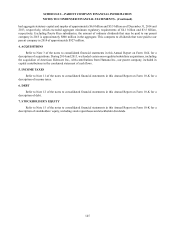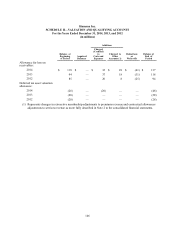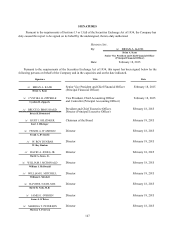Humana 2014 Annual Report Download - page 152
Download and view the complete annual report
Please find page 152 of the 2014 Humana annual report below. You can navigate through the pages in the report by either clicking on the pages listed below, or by using the keyword search tool below to find specific information within the annual report.144
Humana Inc.
SCHEDULE I—PARENT COMPANY FINANCIAL INFORMATION
NOTES TO CONDENSED FINANCIAL STATEMENTS
1. BASIS OF PRESENTATION
Parent company financial information has been derived from our consolidated financial statements and excludes
the accounts of all operating subsidiaries. This information should be read in conjunction with our consolidated financial
statements.
2. TRANSACTIONS WITH SUBSIDIARIES
Management Fee
Through intercompany service agreements approved, if required, by state regulatory authorities, Humana Inc.,
our parent company, charges a management fee for reimbursement of certain centralized services provided to its
subsidiaries including information systems, disbursement, investment and cash administration, marketing, legal,
finance, and medical and executive management oversight.
Dividends
Cash dividends received from subsidiaries and included as a component of net cash provided by operating activities
were $927 million in 2014, $967 million in 2013, and $1.2 billion in 2012.
Guarantee
Through indemnity agreements approved by state regulatory authorities, certain of our regulated subsidiaries
generally are guaranteed by our parent company in the event of insolvency for; (1) member coverage for which premium
payment has been made prior to insolvency; (2) benefits for members then hospitalized until discharged; and (3) payment
to providers for services rendered prior to insolvency. Our parent has also guaranteed the obligations of our military
services subsidiaries.
Notes Receivables from Operating Subsidiaries
We funded certain subsidiaries with surplus note agreements. These notes are generally non-interest bearing and
may not be entered into or repaid without the prior approval of the applicable Departments of Insurance.
Notes Payable to Operating Subsidiaries
We borrowed funds from certain subsidiaries with notes generally collateralized by real estate. These notes, which
have various payment and maturity terms, bear interest ranging from 0.98% to 6.65% and are payable in 2015 and
2018. We recorded interest expense of $1 million related to these notes for each of the years ended December 31, 2014,
2013 and 2012.
3. REGULATORY REQUIREMENTS
Certain of our insurance subsidiaries operate in states that regulate the payment of dividends, loans, or other cash
transfers to Humana Inc., our parent company, and require minimum levels of equity as well as limit investments to
approved securities. The amount of dividends that may be paid to Humana Inc. by these insurance subsidiaries, without
prior approval by state regulatory authorities, or ordinary dividends, is limited based on the entity’s level of statutory
income and statutory capital and surplus. In most states, prior notification is provided before paying a dividend even
if approval is not required. Actual dividends paid may vary due to consideration of excess statutory capital and surplus
and expected future surplus requirements related to, for example, premium volume and product mix.
Although minimum required levels of equity are largely based on premium volume, product mix, and the quality
of assets held, minimum requirements vary significantly at the state level. Our state regulated insurance subsidiaries



